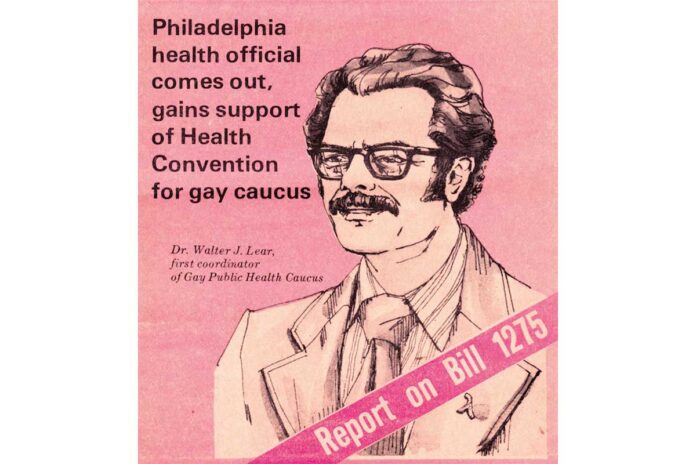Delaware Valley Legacy Fund recently announced the creation of the Walter J. Lear Endowed Fund, which will provide grants to community-building organizations which work with equity and inclusion within the LGBTQ+ community, health concerns and issues related to the LGBTQ+ community, and research aimed at bolstering the rights of the LGBTQ+ community, all things which reflect Lear’s vision and life’s work.
The fund comes from a $250,000 gift from Lear’s estate, which was presented by executor John Mosteller. The initial gift will be placed in an investment vehicle managed by the Philadelphia Foundation and will start to produce grants after one year.
“It is a great honor for our organization to be able to perpetually administer this generous gift from a truly remarkable member of our community. We are eager to help carry on Walter Lear’s tremendous legacy of uplifting and empowering equity, inclusion, and better health within the LGBTQ+ community,” outgoing DVLF board president Fernando Gonzalez said in a press release. Among his many accomplishments, Lear was a co-founder of DVLF.
Gonzalez was joined by DVLF co-founder John Cunningham, William Way Community Center executive director Chris Bartlett, and archivist Kevin Jones for a livestream announcement of the endowment fund.
“When it came to starting DVLF… I thought, who can I turn to for advice?” Cunningham said during the livestream. “And of course Walter was the one who sprung to my mind, because he knew everybody.”
After working for several years at the U.S. Public Health Service, Dr. Lear came to Philadelphia in 1964 and was appointed by Mayor James Tate to be Philadelphia deputy health commissioner. He was then appointed by Governor Milton Shapp to be Commissioner of Health for the Southeast Region of the Commonwealth in 1971. When he came out in 1975, he became the first openly gay executive officer in government leadership. Lear was featured on the cover of the very first issue of Philadelphia Gay News in January 1976, when he was elected General Coordinator of the Gay Public Health Workers caucus of the American Public Health Association.
Throughout his career, Lear combined civil-rights, health and LGBT activism, both nationally and locally, and he founded and co-founded many current Philadelphia LGBT community agencies. He was the first openly gay person to join the Philadelphia Human Relations Commission as well as an active member of ACT UP. He helped launch organizations including Penguin Place, the predecessor of William Way LGBT Community Center, and Lavender Health Project, the predecessor of Mazzoni Center. Lear was also co-founder of the Philadelphia AIDS Task Force and the local chapter of the Radical Faeries, as well as a founding member of the Maternity Care Coalition and Physicians for Social Responsibility.
“He was very, very motivated to address injustices he saw in the world,” Mosteller told PGN in 2010. “He was focused, which helped to make it possible for him to stay on a project even in the midst of political wrangling. He had a great deal of patience for the bureaucratic process because he was so driven and cared so much about the downtrodden.”
To start off the endowment fund, William Way Community Center will receive $25,000 for naming rights to the Center’s library and reading room, which will honor the legacy of Lear and his longtime partner, James F. Payne. WWCC will also receive half of all the fund’s future endowment interest in perpetuity.
Chris Bartlett, executive director of WWCC, credited Lear with introducing him to LGBT activism and activists in the early ‘90s.
“In the course of getting to know him, I realized that he was a tremendous man,” Bartlett said during the fund announcement. “Really, from the time he was a young man through the time he passed away, he was an incredible activist.”
Up until his death in 2010, Lear worked with new activists to both guide and inspire them, including Kevin Jones, who founded the Black LGBT Archivist’s Society as well as Blactiquing, which collects, preserves and shares Black memorabilia and antiques.On the launch of Blactiquing, Jones, who met Lear in 2007, said “it really captures all of what I believe that Walter inspired and would have wanted, in terms of being able to bring together new artists and new voices, bringing art and history and activism in different places, not just in museum settings but in community settings, where we make history accessible and we make it alive. I’m grateful for the spirit of Walter Lear, because I think that’s what helps us and helps me to excel.”
